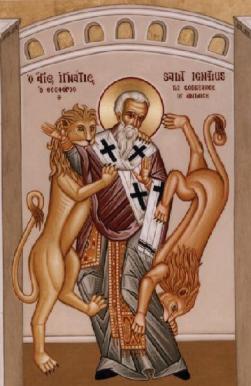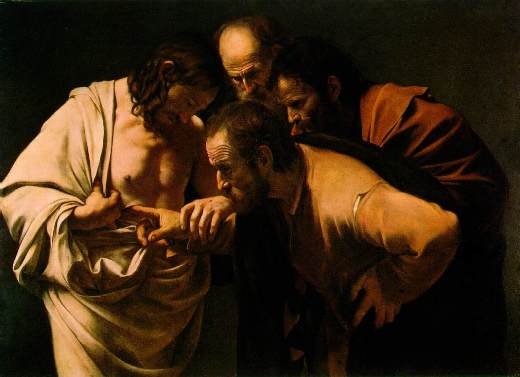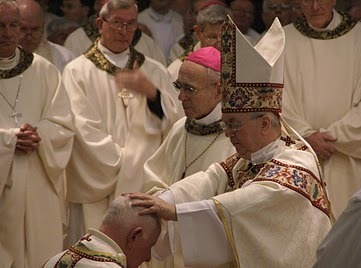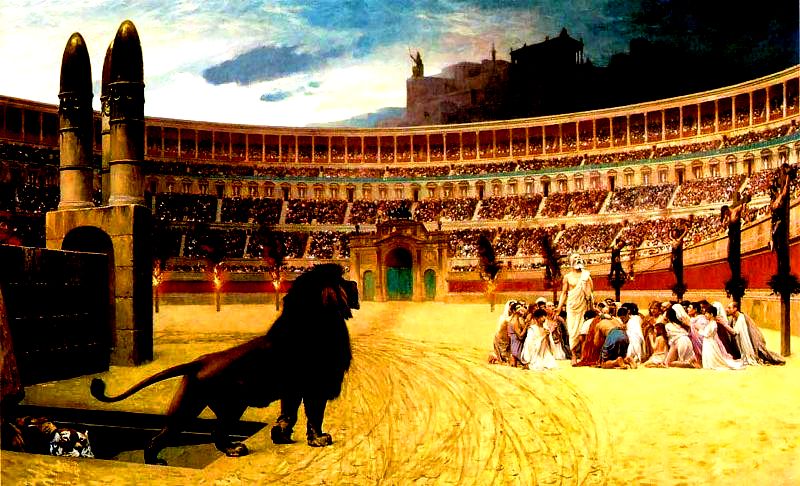Who’s your daddy? St. Ignatius of Antioch
 This is the first entry in what I hope to be a regular series of posts about the Early Church Fathers.
This is the first entry in what I hope to be a regular series of posts about the Early Church Fathers.
It is a good thing to study the Early Fathers because by reading their writings we can get a better picture of what the Church looked like during those early centuries, both during the years of persecution and the years of peace.
The Church Fathers speak to us of the Faith they learned from the Apostles and from their immediate successors. If we would sit and listen, their words can still instruct and inspire us today, just as they did for Christians under their care in their own time.
I would like to begin this series of entries with my favourite Early Church Father, the inspirational martyr and gifted writer, St. Ignatius of Antioch.
“Blessed is the man who perseveres under trial, because when he has stood the test, he will receive the crown of life that God has promised to those who love him.”
– James 1:12
My posts on the Fathers will not normally be this long, but reading St. Ignatius for the first time had some a profound effect on me I want to try and do him justice. Read to the end, it’ll be worth it, I promise.
Coronation in Rome
St. Ignatius, also known as “Theophorus” (literally, “God bearer”), was the third bishop of Antioch (Acts 11:26) and early biographers say that he was a convert taught by the Apostle John and appointed bishop by Peter and Paul. Ignatius led the very important church of Antioch for approximately forty years until he was condemned to death during the persecution of the emperor Trajan. Ignatius would have probably have been one of the most important bishops alive in the Christian world at the time, particularly after the recent death of the Apostle John (c. 100 AD). Ignatius was arrested in Antioch and, like St. Paul, taken in chains to Rome.
Trajan’s persecution was fairly brief and not very wide-ranging. During the early persecutions, the Romans seemed to think that if they killed the shepherds, the sheep would scatter and that would be the end of Christianity. In this respect they would be proved to be exceedingly wrong, as persecution only won more converts to Christ. Tertullian would later bear witness to this, saying, “The blood of the martyrs is seed [of new Christians]”.
On his way to Rome, Ignatius wrote seven letters. At Smyrna, he was met by delegates from the churches of Tralles, Magnesia, and Ephesus, including their respective bishops Polybius, Damasus and Onesimus. After meeting with them he sent them back with letters for their churches. At Smyrna he also wrote to the church of Rome where some of his friends had travelled ahead directly – Ignatius was afraid that influential Christians in that city would attempt to mitigate his death sentence. After Smyrna he was taken to Troas, where he wrote letters to the churches of Philadelphia and Smyrna, as well as a personal letter to Smyrna’s bishop, St. Polycarp.
In 107 AD, Ignatius won his martyr’s crown in Rome, being torn to pieces by wild animals. After his Martyrdom his few remains were taken back to Antioch where they were venerated as relics.
Legacy of Letters
The letters Ignatius wrote are, quite simply, wonderful. In Polycarp’s later writings he tells us that Ignatius’ letters were in great demand, even before his martyrdom. They were read in the early liturgies and were so respected that they were even considered by some for inclusion in the canon of Scripture! This is actually hardly surprising since his writing style often resembles that of St. Paul and, like all the Fathers, you can see the Scriptural resonances all in his writing. I think Mike Aquilina said it best when he wrote:
“His epistles are compact and to the point, pastoral in manner, doctrinal in content [and] encouraging in tone”
– Mike Aquilina, “The Fathers of the Church”
It is for this reason I recommend Ignatius’ letters to those who are just beginning to investigate the Church Fathers.
“I believe…”
You can’t help but notice as you read Ignatius’ letters how parts of them appear to be primitive creeds. For example, the following passage should sound familiar to anyone who recited the Nicene Creed last Sunday:
“He was truly of the seed of David according to the flesh, and the Son of God according to the will and power of God; …He was truly born of a virgin, was baptized by John…and was truly, under Pontius Pilate and Herod the tetrarch, nailed [to the cross] for us in His flesh”
– Letter to the Smyrnaeans
It is quite likely that these were the professions of faith which were made at baptism in the early centuries.
“God from God…”
I’m starting to lose count of the number of times I’ve heard silly statements like “Nobody believed that Jesus was God until Constantine forced everyone to believe it at the Council of Nicea”. I can pretty much guarantee that anyone who makes such a ridiculous statement has never cracked open the New Testament or a history book, choosing instead to receive all their tutoring from Dan Brown and “The Da Vinci Code”.
So what did Ignatius in 107 AD say about Jesus’ divinity?
“…through the majesty of the Most High Father, and Jesus Christ, His only-begotten Son; …according to the love of Jesus Christ our God… [I wish] abundance of happiness unblameable, in Jesus Christ our God.
…For our God, Jesus Christ, now that He is with the Father, is all the more revealed [in His glory]…”
– Letter to the Romans
From quotations such as these, it is clear that Ignatius believed Jesus to be divine. It’s interesting to note, however, that what he actually spends most of his time defending in his letters is not Christ’s divinity, but His humanity…
“…He was born of the Virgin Mary and became man”
At the time Ignatius wrote his letters, the Gnostic group called the Docetists (see 1 John 4:1-3) claimed that Jesus was not truly human, but only “appeared” to have a body and therefore only “appeared” to suffer and die on the cross.
The whole concept of Gnosticism is fascinating and I’ll later probably devote an entire post to try and explain their rather strange beliefs. However, the fundamental principal to Gnosticism is that the body is “bad” and the spirit is “good”. This is not orthodox Christianity, which affirms the goodness of both body and soul, since both were made by God.
From the Gnostic belief that all matter is “bad” flowed the belief that Jesus couldn’t possibly have truly have had a body. Ignatius has some very strong words to say about such an idea:
“And He suffered truly, even as also He truly raised up Himself, not, as [the Docetists] maintain, that He only seemed to suffer…
For I know that after His resurrection also He was still possessed of flesh, and I believe that He is so now. When, for instance, He came to those who were with Peter, He said to them, Lay hold, handle Me, and see that I am not an incorporeal spirit. And immediately they touched Him, and believed, being convinced both by His flesh and spirit…”
– Letter to the Smyrnaeans
In his paraphrase of Luke 24, Ignatius affirms that Jesus did truly have a human body. We also find in his writing an early expression of the doctrine of the Hypostatic Union:
“…There is one Physician who is possessed both of flesh and spirit; both made and not made; God existing in flesh; true life in death; both of Mary and of God; first passible and then impassible”
– Letter to the Ephesians
Ignatius warns his readers not to listen to those who deny this:
“…use Christian nourishment only, and abstain from food of a different kind; I mean heresy. For those [that are given to this] mix up Jesus Christ with their own poison, speaking things which are unworthy of credit, like those who administer a deadly drug in sweet wine, [and those]…ignorant greedily take, with a fatal pleasure leading to his own death.”
– Letter to the Trallians
Evidence of Catholicism in 107 AD?!
According to the conspiracy theorists, other inventions of the Council of Nicea included Jesus’ real presence in the Eucharist, consecrated virginity, primacy of the church of Rome and the hierarchical priesthood. Unfortunately for them, Ignatius’ letters provide evidence all to the contrary.
For the sake of space, I won’t address all of these issues, but it really is impossible to read Ignatius’ letters without noticing how Catholic they are. In fact, it is in Ignatius’ letter to the Smyrnaeans that we find the first occurrence of the phrase “Catholic Church”:
“See that you all follow the bishop, even as Jesus Christ does the Father, and the presbytery as you would the apostles; and reverence the deacons, as being the institution of God. Let no man do anything connected with the Church without the bishop.
Let that be deemed a proper Eucharist, which is [administered] either by the bishop, or by one to whom he has entrusted it. Wherever the bishop shall appear, there let the multitude [of the people] also be; even as, wherever Jesus Christ is, there is the Catholic Church”
– Letter to the Smyrnaeans
Bishop, presbyters and deacons – exactly the same structure in 107 AD as we find today in the Catholic Church. In many parts of his letters, like in the extract above, Ignatius emphasises how important it is to remain with the bishop as an antidote to falling prey to heresy:
“As children of light and truth, flee from division and wicked doctrines; but where the shepherd is, there follow as sheep. For there are many wolves that appear worthy of credit, who, by means of a pernicious pleasure, carry captive those that are running towards God; but in your unity they shall have no place”
– Letter to the Philadelphians
Related to this, Ignatius again and again affirms the unity of the Church:
“It is fitting that you should run together in accordance with the will of your bishop, which…you do. For your justly renowned presbytery, worthy of God, is fitted as exactly to the bishop as the strings are to the harp. Therefore in your concord and harmonious love, Jesus Christ is sung. And man by man, become a choir, that being harmonious in love, and taking up the song of God in unison, you may with one voice sing to the Father through Jesus Christ, so that He may both hear you, and perceive by your works that you are indeed the members of His Son. It is profitable, therefore, that you should live in an unblameable unity, that thus you may always enjoy communion with God”
– Letter to the Ephesians
“I therefore did what belonged to me, as a man devoted to unity. For where there is division and wrath, God does not dwell. To all them that repent, the Lord grants forgiveness, if they turn in penitence to the unity of God, and to communion with the bishop”
– Letter to the Philadelphians
But not only is this unity found in the bishop, but in the Eucharist he celebrates:
“Let no man deceive himself: if any one be not within the altar, he is deprived of the bread of God …He, therefore, that does not assemble with the Church, has even by this manifested his pride, and condemned himself…
…so that you obey the bishop and the presbytery with an undivided mind, breaking one and the same bread, which is the medicine of immortality, and the antidote to prevent us from dying, but [which means] that we should live for ever in Jesus Christ”
– Letter to the Ephesians
“[The Docetists] abstain from the Eucharist and from prayer, because they confess not the Eucharist to be the flesh of our Saviour Jesus Christ, which suffered for our sins, and which the Father, of His goodness, raised up again. Those, therefore, who speak against this gift of God, incur death in the midst of their disputes. But it were better for them to treat it with respect, that they also might rise again…”
– Letter to the Smyrnaeans
“Take heed, then, to have but one Eucharist. For there is one flesh of our Lord Jesus Christ, and one cup to [show forth ] the unity of His blood; one altar; as there is one bishop, along with the presbytery and deacons, my fellow-servants: that so, whatsoever you do, you may do it according to [the will of] God”
– Letter to the Philadelphians
The language here is of Eucharistic realism. The Eucharist is called “the medicine of immortality” that gives the Christian a share in the life of Christ. Ignatius describes the Eucharist as “the flesh of…Jesus Christ, which suffered for our sins” which shows the “unity of His blood” on the “one altar”. This is sacrificial language. This is Catholic language…
A heart for his flock
What makes Ignatius’ letters so superb is that, like Paul, his personality really comes across in his writing. Even as he’s being taken away to be executed, we see the tenderness with which he still cares for his flock back in Antioch. In his letters he constantly asks the other churches to pray for his former congregation:
“Remember in your prayers the Church in Syria, which now has God for its shepherd, instead of me. Jesus Christ alone will oversee it, and your love [will also regard it]. But as for me, I am ashamed to be counted one of them; for indeed I am not worthy, as being the very last of them”
– Letter to the Romans
A heart for Christ
However, what most leaps off the pages of Ignatius’ letters is his consuming love for Christ. Ignatius is so in love with Jesus he wants to imitate Him in the most extreme way: by suffering martyrdom.
On Paul’s missionary journey he was warned by the Spirit of his impending arrest (Acts 21:10-14) and those Christians he encountered grieved for him (Acts 20:13-38), but his determination was resolute. Like Paul before him, Ignatius saw the crown set before him (2 Timothy 2:4) and would not let anything else get in the way. Therefore, in his letter to the Romans Ignatius begs the Roman church not to interfere with his scheduled execution.
I am certain that the words and deeds of Ignatius were of comfort to many of the martyrs who would die under Roman persecution in the years to come:
For the beginning has been well ordered, if I may obtain grace to cling to my lot without hindrance unto the end. For I am afraid of your love, lest it should do me an injury…
… For if you are silent concerning me, I shall become God’s; but if you show your love to my flesh, I shall again have to run my race. Pray, then, do not seek to confer any greater favour upon me than that I be sacrificed to God while the altar is still prepared; that, being gathered together in love, you may sing praise to the Father, through Christ Jesus, that God has deemed me, the bishop of Syria, worthy to be sent for from the east unto the west. It is good to set from the world unto God, that I may rise again to Him.
…[I] only request…both inward and outward strength, that I may not only speak, but [truly] will; and that I may not merely be called a Christian, but really be found to be one…
I write to the Churches, and impress on them all, that I shall willingly die for God, unless you hinder me. I beseech of you not to show an unseasonable good-will towards me. Allow me to become food for the wild beasts, through whose instrumentality it will be granted me to attain to God. I am the wheat of God, and let me be ground by the teeth of the wild beasts, that I may be found the pure bread of Christ…
Now I begin to be a disciple. And let no one, of things visible or invisible, envy me that I should attain to Jesus Christ. Let fire and the cross; let the crowds of wild beasts; let tearings, breakings, and dislocations of bones; let cutting off of members; let shatterings of the whole body; and let all the dreadful torments of the devil come upon me: only let me attain to Jesus Christ.
All the pleasures of the world, and all the kingdoms of this earth, shall profit me nothing. It is better for me to die on behalf of Jesus Christ, than to reign over all the ends of the earth. For what shall a man be profited, if he gain the whole world, but lose his own soul? Him I seek, who died for us: Him I desire, who rose again for our sake. This is the gain which is laid up for me. Pardon me, brethren: do not hinder me from living, do not wish to keep me in a state of death; and while I desire to belong to God, do not give me over to the world. Allow me to obtain pure light: when I have gone there, I shall indeed be a man of God. Permit me to be an imitator of the passion of my God.
St. Ignatius, pray for us.
If you would like to know more about St. Ignatius and the Early Fathers in general, I can highly recommend Professor Feingold’s excellent lecture series for the Association of Hebrew Catholics. He includes an entire lecture on St. Ignatius and also answers questions from the audience. There is also a radio interview on St. Ignatius by Mike Aquilina and his site The Way Of The Fathers is brilliant.
I also strongly encourage you to read his letters yourself in their entirety and and you can even listen to Ignatius’ letters on MP3.
A variety of translations of his letters may also be found at EarlyChristianWritings.com and some commentary on them at the Christian Classics Ethereal Library.





Pingback: Scripture Alone?…from the beginning, it was not so! – Part 5 – The Pint, The Pipe and The Cross
Hi, Love your blog! In this article you mentioned that Apostle John died in 100 AD. I was wondering if there are records mentioning this date? I have heard that his body was never found ..
Thanks 🙂
The two folks you want to check out are Tertullian and Papias of Hierapolis (probably less reliable), as well as “The Church History Of Eusebius”